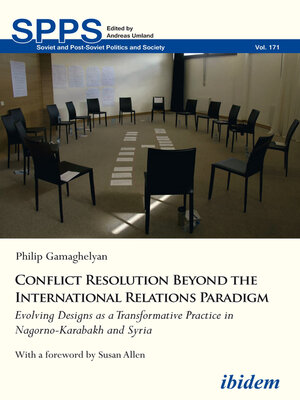Conflict Resolution Beyond the International Relations Paradigm
ebook ∣ Evolving Design as Transformative Practice in Nagorno-Karabakh and Syria · Soviet and Post-Soviet Politics and Society
By Philip Gamaghelyan

Sign up to save your library
With an OverDrive account, you can save your favorite libraries for at-a-glance information about availability. Find out more about OverDrive accounts.
Find this title in Libby, the library reading app by OverDrive.



Search for a digital library with this title
Title found at these libraries:
| Library Name | Distance |
|---|---|
| Loading... |
Conflict Resolution holds the promise of freeing approaches and policies with regard to politics of identity from the fatalistic grip of realism. While the conceptual literature on identity and conflicts has moved in this alternative direction, conflict resolution practice continues to rely on realist frames and acts as an unwanted auxiliary to traditional International Relations (IR). Perpetuation of conflict discourses, marginalization, and exclusion of affected populations are widespread. They are caused by the over-reliance of conflict resolution practice on the binary frames of classic IR paradigms and also by the competitive and hierarchical relationships within the field itself. Philip Gamaghelyan relies on participatory action research (PAR) and collective auto-ethnography to expose patterns of exclusion and marginalization as well as the paradoxical reproduction of conflict-promoting frames in current conflict-resolution practice applied to the Nagorno-Karabakh and Syrian crises. He builds on the work of post-modernist scholars, on reflective practice, and on discourse analysis to explore alternative and inclusive strategies with a transformative potential through reflections and actions customary for PAR. The IR discipline, that has dominated policy-making, is only one possible lens, and often a deficient one, for defining, preventing, or resolving contemporary conflicts wrapped in identity politics. Other conceptual frameworks can help to rethink our understanding of identity and conflicts and reconstruct them as performative and not static phenomena. These transformative frameworks are increasingly influential in the conflict resolution field and can be applied to policy-making.







